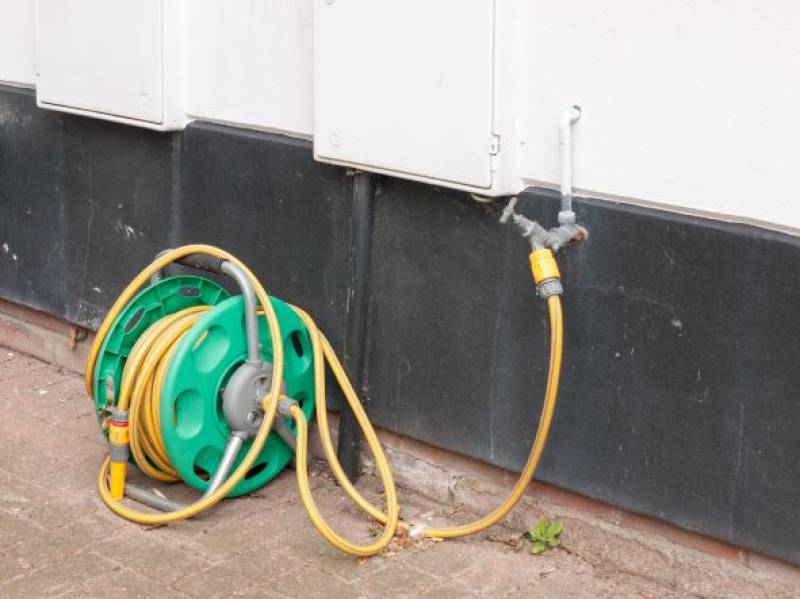Spanish News Today Editors Roundup Weekly Bulletin Sept 24
CLICK HERE FOR THE FEATURE ARTICLES "Spain extends entry restrictions for UK travellers until November 15" and "Changes to Spanish taxes could save expats money"
It’s been a turbulent sort of week in Spain, with two major issues overshadowing almost everything else, for better or for worse.
First, Spain has brought the discussion about the Covid-19 pandemic back to the fore by agreeing to consider allowing people not to wear facemasks on public transport, by starting its vaccination campaign with the second booster jab next Monday, by removing the need for foreign travellers to fill in the health form when they enter the country and, conversely, to extend its requirement for third-country tourists to prove they don’t have Covid.
At the same time, several regions of Spain have announced juicy-sounding tax cuts, while the government has responded with a new tax on the wealthiest 1% in society in a battle of wills that may benefit expats in the short term but which critics claim will lead to public services like health centres and fire stations being shut down.
When one virus ends, another begins
Although autumn has only just started, it feels like winter is closing in quickly here in Spain and this coming weekend is expected to bring a dramatic change in the weather. The cooler, often damp days bring their own viruses and illnesses while Covid still lurks, albeit quietly in the background. The flu hasn’t created many waves in recent years, and it was almost stamped out during the 2020-2021 season. But the experts warned this week that this may have caused a false sense of security and are in fact
preparing for a “worst case scenario” in the next few months.
The main issue is that stringent coronavirus prevention methods like careful hand-washing, social distancing and masks have actually robbed influenza of its usual breeding grounds throughout the pandemic, so while we were busy trying to keep Covid infections down, we also dealt the flu a heavy blow.
This year is a different kettle of fish, however, and like most persistent ailments, influenza has learned to adapt. The latest report of the Influenza Surveillance System in Spain shows that flu emerged at the end of spring, peaking between July and the last week of August, only for cases to begin decreasing again in early September.
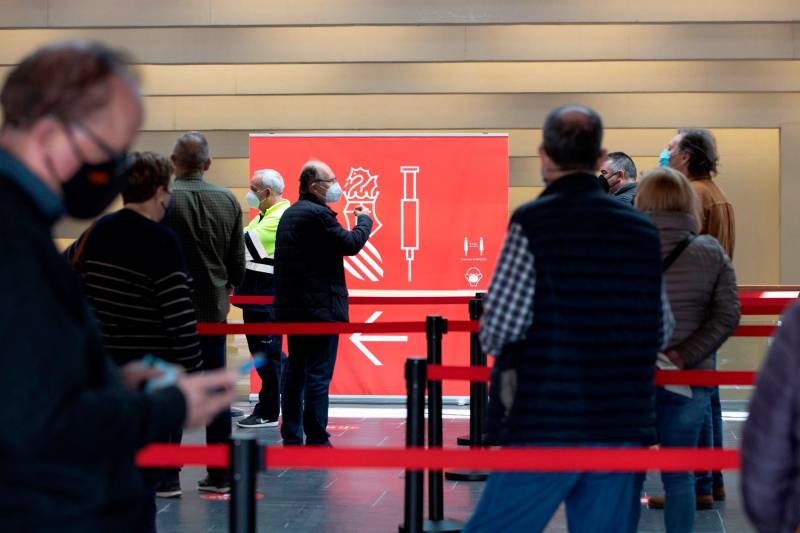
The fact that the flu virus is behaving uncharacteristically, passing by almost undetected during the colder months, has led experts to fear that Spain could be in for a tough winter. The flu vaccination campaign will begin in the first week of October, and the best advice of virologists is that people over the age of 65, as well as those with underlying illnesses, receive the flu jab.
To this end, the Ministry will kick off the latest Covid booster campaign this coming Monday (September 26), offering a fourth dose to people over the age of 80 and those living and working in nursing homes and other healthcare settings. From here, the schedule will move downwards until it reaches all over-60s.
And it doesn’t stop there. The new test can even distinguish between influenza A and influenza B.

The procedure for self-testing is identical. Customers have the choice of taking a nasal or saliva swab and follow the usual guidelines, but the big difference is in the results. The new dual tests will have two windows instead of one, and each will contain a ‘C’ control line that must be marked to show that the test has been conducted correctly.
If the patient is Covid positive, the ‘T’ line will be highlighted in the coronavirus window. If they have the flu, either line ‘A’ or ‘B’ will show a mark, depending on the strain.
The Association of Urban and Metropolitan Public Transport (ATCU) has argued that the mask-wearing rule is hindering the recovery of urban and interurban travel, while Covid authority Fernando Simón believes that forcing people to wear masks on buses, trains and the metro is pointless when the Covid figures are at their lowest point since November 2021 and there are far more dangerous places for people to gather, like concerts and packed bars.
For now, the Health Minister is sticking to her guns and deferring to the Covid Alerts Committee, but she has agreed to at least open the topic for discussion.
This isn’t as confusing as it sounds, as unjabbed travellers no longer need to download a QR code from the Spanish health app, but can instead show their NHS Pass or paper proof that they meet all the requirements.
For all the latest coronavirus news and updates in Spain, use the following link: CORONAVIRUS LATEST NEWS
The taxman
Marvin Gaye once sang, “There’s only three things for sure… taxes, death and trouble.” Well, this week that’s certainly been proved true judging by the trouble created when some Spanish politicians wanted to visit death on certain taxes.
Ostensibly these tax cuts – up to 100% in the case of Andalusia – are aimed at bringing down the cost of living for ordinary families hit hard by rising prices across the board. However, it has
opened up a chasm between the left and the right in Spain over the issue of whether to ease the burden on common people by lowering the amount of taxes they have to pay, or whether to raise taxes, especially on the rich, to subsidise social initiatives to help people.
Both Andalusia and Murcia are run by the conservative party in Spain, the PP, which is being criticised for its unilateral move to lower taxes by Spain’s central government, run by the Socialist PSOE party, who claim that they need those taxes in order to fund such social projects as free train travel, the 20-cents-per-litre reduction on fuel and the proposed cap on basic food items in supermarkets.
Thus, in response to the decision by right-wing-led autonomous communities, the government has said it will “harmonise” taxes, effectively taking away power from the communities to decide their own fiscal affairs and make tax rates equal across the board… at a higher rate than they are now, naturally.
They have also announced
plans to introduce yet another windfall tax (in addition to the one they are levying on big banks and electricity companies) that will target the wealthiest 1% of people in Spain, to the benefit of the 99%.
All of this back-and-forth over taxes going up and down is best understood against the backdrop of the general election to be held in Spain next year, in November 2023. It is largely because of this that the parties are desperate to win the hearts and minds of voters with popular, cost-cutting initiatives. And in the meantime, we can expect a host of new laws and social initiatives – both at the national level and regionally – that will, in theory, at least, make life better, cheaper and far more administratively confusing in Spain.
Locked out of her own home
Patricia asked the occupiers to leave her house when their contract expired in June but they refused, and even had the gall to take out a restraining order against the pensioner when she tried to enter the property. With no income and mortgage owing on the home, Patricia had no choice but to move back to the UK this summer and rent.
The expensive and traumatic ordeal may be reaching its climax, however, as the expat is taking the squatters to court on October 14, and all going well the keys should be handed back to her. But Patricia will be back before a judge four days after that to defend herself against the lawsuit which is being filed against her by the tenants who, Patricia claims, own horses and several cars while she is “on the street and with no income”.
The despondent Briton will have to stay with a friend when she comes back to Alicante, and now fears that she will lose her house. She has paid the mortgage on the property religiously for the last 20 years, but because of this situation she is no longer able to make the payment. And she fears that after fighting so long and so hard to get her house back from her defaulting tenants, it will be the bank that takes it away from her in the end if she can’t pay her mortgage.
The lawyers representing the squatters said that the tenants would agree to leave if Patricia writes off the 30,000 euros in debt, but after all she’s been through, the expat is determined to have her day in court.
“Now I’m going to go all the way. It is an injustice. And I don’t want these people to do the same thing to other homeowners. I know that technically they are not ‘squatters’, as I rented the house to them and they didn’t force the doors open and come in. But, in the end, they are. They have taken over a house that is not theirs.”
Murcia
Fiestas and other celebrations in Murcia this week, with several wins giving reasons to be cheerful.
For the British expats who bought homes on the El Valle del Sol property development between 2005 and 2006 have finally received some sort of justice almost two decades on, as the five so-called ‘property developers’ who scammed them into buying land that they didn’t actually own
have been court-ordered to pay out large amounts in compensation.
The saga dates back to the mid-noughties when the residential properties were built on plots of land in the district of Gea and Truyols in central Murcia without the landowner’s permission, making them illegal. Nonetheless, these unlawful villas were sold to British buyers, who were duped into thinking they were purchasing the home of their dreams.
Now, the ordeal is almost over – or at least there has been some recognition of wrongdoing – as the five property developers entered a guilty plea in court and reached a deal with the Prosecutor’s Office, narrowly avoiding the proposed prison sentence of between six and nine months. Instead, they will have to pay compensation of between 10,000 euros to each of the Brits affected by their fraud, and pay out a further 20,000 euros in administrative and legal fees.
It has been a long battle that has lasted for two years and in which the initial Popular Legislative Initiative (ILP) initial petition, which was signed by more than 600,000 people, was instrumental. Now, thanks to a final vote by the Congress of Deputies, the Mar Menor will be given legal personhood, greatly increasing its rights to protection, conservation and restoration.
As part of the new legislation, the management of the lagoon will be overseen by several committees expressly created for the purpose and it also allows anyone who feels the lagoon’s ecosystem is being damaged or polluted to bring a legal case against the alleged culprit with all costs covered if the court rules in their favour.
It wasn’t all good news, however, as the regional assembly vetoed a proposal to make the Mar Menor into a regional park. But the ILP is certainly another great leap in the right direction.
This year, the fight takes place on the evening of Friday 23, while there is a big parade of troops through the streets of Cartagena on the Saturday evening, starting at 7pm, and a huge fireworks display on Sunday night at 10pm. Not to be missed!
There’s loads more going on in Murcia this autumn. Check out our EVENTS DIARY for some ideas of what to do:
Spain
Spain’s impressive tourism bounce-back looks set to continue well into the autumn-winter season with the announcement that
the airline Finnair will increase its operations in Spain from the last weekend in October, connecting six Spanish airports with Helsinki, adding no fewer than 40 weekly flights.
The airline already operates daily flights from Barcelona and Madrid, so the new trips will include a 7-day option from Las Palmas de Gran Canaria, six flights per week from Tenerife, three weekly flights from Alicante and up to ten from Malaga.
Sources claim that the new PM is “flexible in the good sense of the word”, and hoped that reaching a deal on Brexit and Gibraltar would be “less showy and vehement” than with her predecessor, Boris Johnson.
Alongside mobility, the Spanish government considers security, defence and trade policy to be the three pillars of the future bilateral relationship. But doubts persist about whether Spain will continue to insist on joint sovereignty over the Rock of Gibraltar as part of any deal, and whether they will hold Brits to ransom over the driving licence issue until they get their way.
Only time will tell, but there’s no telling how much time…
Alicante
Fire crews and emergency workers were under the pump in Benidorm last Sunday, which was the rainiest day the town has seen in several years. In the space of one short hour, 91 litres of water descended on the holiday hotspot and rescue teams were on the streets draining flood water and repairing damage from the early hours of Saturday morning.
The Provincial Consortium of Firefighters of Alicante were called out a total of 20 times in Benidorm city and while the damage from the torrential downpour was extensive, the council was well organised and teams were on site to quickly carry out repairs on homes, walls, roads and beaches in record time.
While most people were ducking for cover, a group of energetic Brits weren’t in the least put out by the rain and entertained passerby with their own unique rain dance when the skies opened at around 2am on Saturday morning. The streets were thronged with bar hoppers and the hilarious antics of the tourists were caught on camera.

Most people saw the funny side, with one Instagram user quipping that Britons baring all shows “Benidorm at its essence any night”.
Spain has been in the news across the globe this summer for the tough stance it’s taking on so-called drunken tourism, and many others were unimpressed by the badly-behaved Brits, seeing this as yet another example of holidaymakers running wild and giving all UK tourists a bad name.
One social media user wrote: “I am sure they would not do that in their country,” while another claimed that “They look like wild pigs.”
“Have some shame please,” a third added.
The 55-year-old woman and 56-year-old man went for a dip on Monday at the popular swimming spot but were hampered by the undertow and unable to get back to shore. The beach was packed with sunbathers and several jumped into the water to help the married couple, who were clearly struggling in the surf. The heroic helpers managed to drag the pair out of the water just as the emergency services arrived but despite extensive first aid, they were both pronounced dead at the scene.
Andalucía
There’s danger of another kind on the Malaga coast after a
24-year-old Irishman was seriously injured in a shooting in Marbella. It happened at around 5.45pm on Tuesday, when several gunshots rang out in the Lago de las Tortugas area of the Costa del Sol town, and the Irish citizen, who has not yet been identified, was gunned down. He was instantly transferred to the Costa del Sol Hospital with a serious wound in his ribcage.
It seems the bullet went straight through his side, in an incident that police are currently treating as being related to a possible settling of scores among criminal elements. Just a day later, in fact, there was another shooting outside a car dealership in the town which left a police car riddled with bullet holes, but thankfully no more casualties.
This is the second time in the space of a few short months that there has been a serious shooting in Marbella. Back in July, the Opium nightclub was the scene of horrendous images of gun crime, purportedly perpetrated by members of a Dutch drugs mafia, that left another Irishman fighting for his life in hospital.

It’s no secret that the sun and laidback way of life on Spain’s southern Costas are a pull for criminals and fugitives, be they Irish, Dutch or of whatever nationality (a
second member of the notorious Irish Kinahan gang was apprehended in Spain in as many weeks) but it’s high time that that came to an end. Spanish and international police forces are doing their part, of course, as are ordinary citizens who respond to pleas from Crimewatch to turn in any suspects. It’s down to all of us to stamp out fugitives from the law on the Costa del Sol and make the community a safer place for all of us who actually abide by the law.
Ryanair blamed the rerouting on the ongoing strike in France by air traffic controllers, which has resulted in delays and cancellations in Spain and across Europe. One of the passengers on the flight, Barry Masterson, created a storm on social media by posting a hilarious blow-by-blow account of the debacle, which involved the passengers being herded onto a coach and bussed 5 hours across the border into Portugal.
“We’re on a five-hour bus to Portugal now and we’ve stopped for petrol and pee stops within five minutes,” he wrote. “Got to Dublin airport 12 hours ago and now I’m in a petrol station in Malaga at 5:41am, send help.”
From a Twitter storm to an actual storm, the rainfall that has battered Andalusia this week after months with virtually no rain at all has left
flooding and damage in towns across Granada and Jaén, with some residents having to be evacuated from their homes in the town of Pedro Martínez and a fire station, a car garage and several ground-floor restaurants and businesses damaged in Andújar.
Incredibly, the rain has not been enough to fill up reservoirs, and such is the extent of the water shortage problem caused by the especially dry summer we have just had that
Seville is poised to announce a hosepipe ban on October 3, the first time it has done so in autumn in more than 20 years.
People will be forbidden to fill up their swimming pools, water their gardens, clean their cars and wash the streets with hoses, while public ponds and fountains that do not recycle their water will have to be shut off, with fines for those who don’t comply.
You may have missed…
- Autumn begins in Spain: How long will it last and when do clocks go back?
Autumn officially begins on Friday September 23, 2022, signalling the end of summer, but how long does the fall season go on for and when do we lose an hour?
- Best chef in the world opens food truck outside El Corte Inglés in Murcia.
Celebrity chef Dabiz Muñoz, who this week was voted the World’s Best Chef for the second year running, has opened a food truck in Murcia city – these are the prices and opening hours.
- Briton, 55, plunges to his death from 400ft Spanish cliff in front of family and friends.
A 55-year-old holidaymaker from London tripped and fell to his death from a 400ft cliff on the Balearic Island of Formentera on Tuesday September 13 as his horrified family and friends looked on helplessly.
- Corvera airport renaming is suspended in the courts once again.
The controversial naming of Murcia’s airport as Juan de la Cierva has been put on hold by the courts yet again.
- Peed off: Ryanair flight to Spain diverted when drunk passenger urinated on seat.
A busy Ryanair flight from Manchester to Tenerife was forced to divert to the Portuguese island of Porto Santo when a drunk and unruly passenger refused to stay in his seat and ended up urinating in the aisle.
That’s all for this week, and all for our first 48 bulletins since we restarted this roundup last year. If you haven’t yet resubscribed for another year,
you can still do so here to keep receiving this email every week.
Alternatively, you can call Laurence on +34 966 260 896 and he will be happy to take a secure payment online over the phone.
Thanks for reading, and we’ll see you next week!
Got a business in Spain? Advertise with us.
Murciatoday.com and its affiliated Spain Today Online sites can help bring your business to a wider audience – over 350,000 unique readers every month. We’ll provide you with custom-made banner ads, a personalised listing in our Business Directory and special feature articles about your particular business niche.
Don’t limit yourself to the yellow pages. Get online! After Covid, can you afford not to? Contact us today to find out how we can get wider exposure for your business.
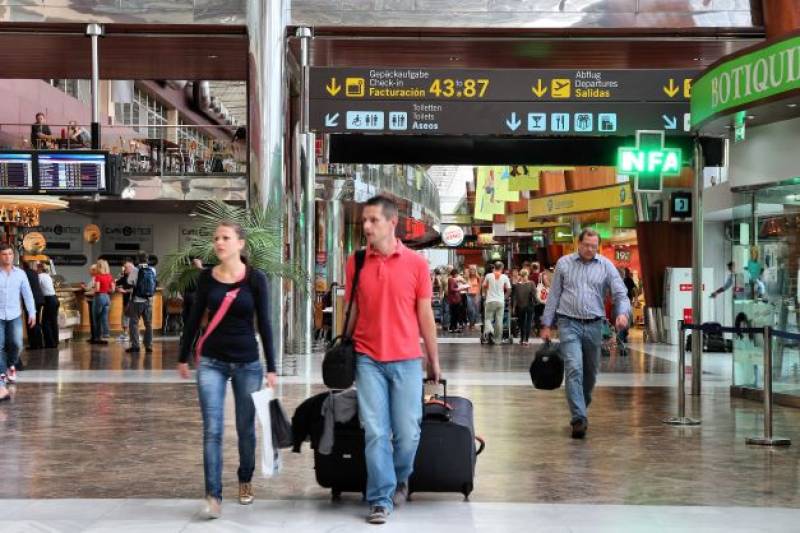
 The fact that the flu virus is behaving uncharacteristically, passing by almost undetected during the colder months, has led experts to fear that Spain could be in for a tough winter. The flu vaccination campaign will begin in the first week of October, and the best advice of virologists is that people over the age of 65, as well as those with underlying illnesses, receive the flu jab.
The fact that the flu virus is behaving uncharacteristically, passing by almost undetected during the colder months, has led experts to fear that Spain could be in for a tough winter. The flu vaccination campaign will begin in the first week of October, and the best advice of virologists is that people over the age of 65, as well as those with underlying illnesses, receive the flu jab. The procedure for self-testing is identical. Customers have the choice of taking a nasal or saliva swab and follow the usual guidelines, but the big difference is in the results. The new dual tests will have two windows instead of one, and each will contain a ‘C’ control line that must be marked to show that the test has been conducted correctly.
The procedure for self-testing is identical. Customers have the choice of taking a nasal or saliva swab and follow the usual guidelines, but the big difference is in the results. The new dual tests will have two windows instead of one, and each will contain a ‘C’ control line that must be marked to show that the test has been conducted correctly.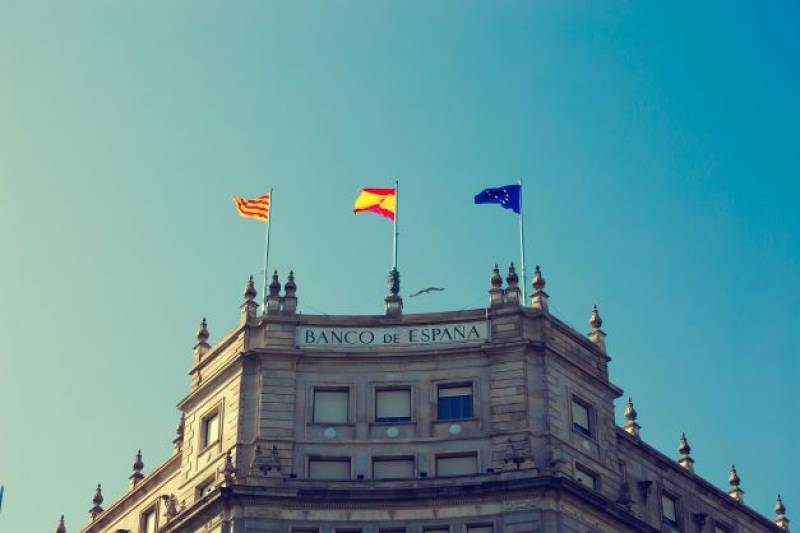
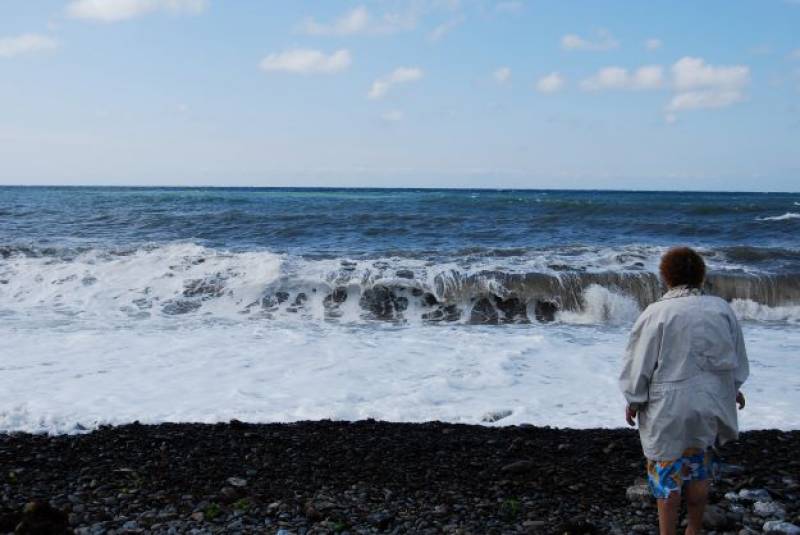
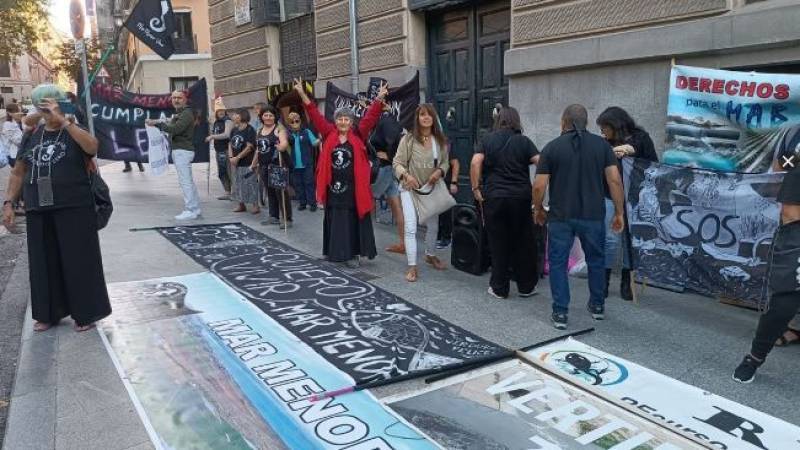 Not only these homeowners, but also environmentalists were celebrating this week as the Mar Menor was at long last granted the status of a legal person, making it the first lagoon in Europe with its own rights.
Not only these homeowners, but also environmentalists were celebrating this week as the Mar Menor was at long last granted the status of a legal person, making it the first lagoon in Europe with its own rights. Finally, a scheduled celebration this weekend as the hugely popular Fiestas de Cartagineses y Romanos in Cartagena reach their climax. For many, the highlight of the yearly Carthaginians and Romans event is the giant mock battle that is staged between the two tribes, suitably decked out in period costumes, complete with swords and shields.
Finally, a scheduled celebration this weekend as the hugely popular Fiestas de Cartagineses y Romanos in Cartagena reach their climax. For many, the highlight of the yearly Carthaginians and Romans event is the giant mock battle that is staged between the two tribes, suitably decked out in period costumes, complete with swords and shields.
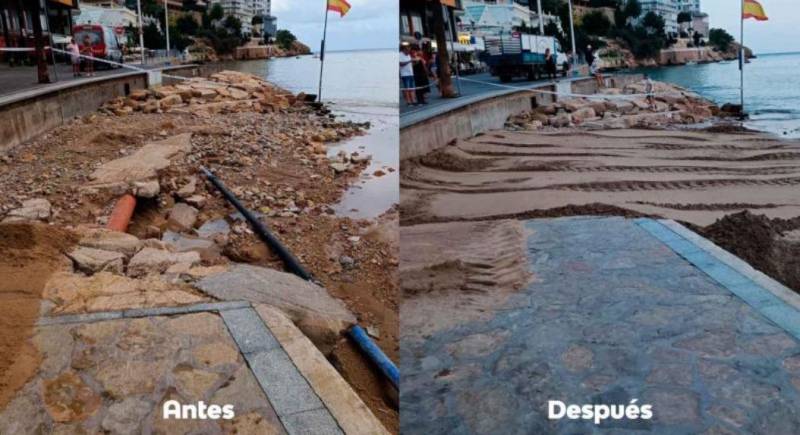
 Most people saw the funny side, with one Instagram user quipping that Britons baring all shows “Benidorm at its essence any night”.
Most people saw the funny side, with one Instagram user quipping that Britons baring all shows “Benidorm at its essence any night”. It’s no secret that the sun and laidback way of life on Spain’s southern Costas are a pull for criminals and fugitives, be they Irish, Dutch or of whatever nationality (a second member of the notorious Irish Kinahan gang was apprehended in Spain in as many weeks) but it’s high time that that came to an end. Spanish and international police forces are doing their part, of course, as are ordinary citizens who respond to pleas from Crimewatch to turn in any suspects. It’s down to all of us to stamp out fugitives from the law on the Costa del Sol and make the community a safer place for all of us who actually abide by the law.
It’s no secret that the sun and laidback way of life on Spain’s southern Costas are a pull for criminals and fugitives, be they Irish, Dutch or of whatever nationality (a second member of the notorious Irish Kinahan gang was apprehended in Spain in as many weeks) but it’s high time that that came to an end. Spanish and international police forces are doing their part, of course, as are ordinary citizens who respond to pleas from Crimewatch to turn in any suspects. It’s down to all of us to stamp out fugitives from the law on the Costa del Sol and make the community a safer place for all of us who actually abide by the law.